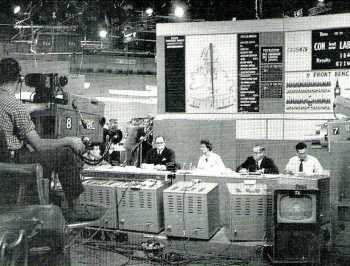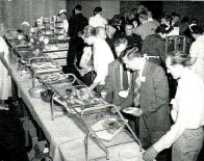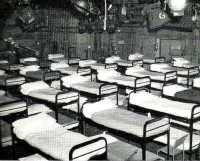Home > Snippets > Operation X
Whirligig Snippets
The
Background to 'Operation X'
When the
General Election (1959) results programme was being planned by
the Television Service, it was obvious that the timing, size, and
complexity of the programme would need a separate small
'supporting operation' on the administrative side. The programme
was designed to last for nearly twenty-four hours; none of the
programme breaks was sufficiently long to allow all staff to go
home; and the only answer was to turn Lime Grove into a hotel for
the night. Central Services Group, with calm efficiency, provided
140 beds in double bunks to equip Studio E, while other beds in
dressing rooms gave slightly more quiet for hard-worked
commentators, and privacy for women. The only complaint heard in
Studio E was that one of the blankets did not tone with its
surroundings.
 It was not possible, owing to the
nature of the programme, to have meals at fixed times in the
restaurants; instead, a running buffet was set up in Studio H,
where programme staff could, at any time, get a snack without
wasting too much time. How it was done remains a secret locked in
the bosoms of Catering Department, but at almost all hours of the
day or night there seemed to be supplies of deliciously fresh,
open sandwiches, piping 'hot dogs', and an amazing variety of
snacks. Quality was high, and the quantities interesting: 700
'hot dogs', 1200 open sandwiches, 500 hot meat pies and pasties,
300 rounds of sandwiches, and 400 portions of fruit tarts with
ice cream, not to mention large quantities of fruit cake,
biscuits, and fruit salad, were served during the operation.
Everyone commented on the excellence of the coffee; because of
the distance from base as much disposable crockery, cutlery,
etc., as possible was used to get over the problem of washing-up.
The unusually high working temperature in Studio G had been
foreseen, and 1500 glasses of iced orangeade disappeared down
parched throats. It seems to have been a thirsty night and day,
for, in addition, 4000 cups of tea and coffee, with 500 glasses
of cold milk or hot bovril and 600 cups of soup, passed over the
counters. Breakfast was served in the restaurant - officially
from 4 a.m. to 7 a.m., but some late sleepers were happily
feeding at 9.30 a.m. - the usual restaurant services for other
staff were in operation, and increased hospitality for the
numerous VIPs was provided. Altogether a tour de force -
surprising only to those who do not know the Catering Service.
It was not possible, owing to the
nature of the programme, to have meals at fixed times in the
restaurants; instead, a running buffet was set up in Studio H,
where programme staff could, at any time, get a snack without
wasting too much time. How it was done remains a secret locked in
the bosoms of Catering Department, but at almost all hours of the
day or night there seemed to be supplies of deliciously fresh,
open sandwiches, piping 'hot dogs', and an amazing variety of
snacks. Quality was high, and the quantities interesting: 700
'hot dogs', 1200 open sandwiches, 500 hot meat pies and pasties,
300 rounds of sandwiches, and 400 portions of fruit tarts with
ice cream, not to mention large quantities of fruit cake,
biscuits, and fruit salad, were served during the operation.
Everyone commented on the excellence of the coffee; because of
the distance from base as much disposable crockery, cutlery,
etc., as possible was used to get over the problem of washing-up.
The unusually high working temperature in Studio G had been
foreseen, and 1500 glasses of iced orangeade disappeared down
parched throats. It seems to have been a thirsty night and day,
for, in addition, 4000 cups of tea and coffee, with 500 glasses
of cold milk or hot bovril and 600 cups of soup, passed over the
counters. Breakfast was served in the restaurant - officially
from 4 a.m. to 7 a.m., but some late sleepers were happily
feeding at 9.30 a.m. - the usual restaurant services for other
staff were in operation, and increased hospitality for the
numerous VIPs was provided. Altogether a tour de force -
surprising only to those who do not know the Catering Service.
 Baths and showers were a problem - the
Television Studios were not designed as a luxury hotel - but the
existing facilities, reinforced by a supply of bath towels 'on
demand', were sufficient. As many people as possible were ferried
to their homes or collected thence by taxi. The scooter
messengers were also busy about the empty streets, collecting the
early provincial and London editions of the morning papers, and
bringing them back for use by the commentators.
Baths and showers were a problem - the
Television Studios were not designed as a luxury hotel - but the
existing facilities, reinforced by a supply of bath towels 'on
demand', were sufficient. As many people as possible were ferried
to their homes or collected thence by taxi. The scooter
messengers were also busy about the empty streets, collecting the
early provincial and London editions of the morning papers, and
bringing them back for use by the commentators.
 On an occasion such as this, it was
a fair guess that the Corporation would not avoid comment and
inquiry from the public; BPX (who maintained a twenty-four hour
service) were able, with the aid of a monitor, to answer the
flood of queries on Party totals, and on particular results, but
something more was needed to cope with more general questions
relating to policy or presentation. The precaution of equipping
Room N.101 with extra telephone parallels and of manning it with
experienced, quick-witted, and urbane Duty Officers and Duty
Clerks proved to be well justified, for the weight of telephone
traffic handled was heavy and its content surprising. The Duty
Office and the Press Office, which also functioned throughout
transmission, together freed programme staff from any distraction
from their task by outside events.
On an occasion such as this, it was
a fair guess that the Corporation would not avoid comment and
inquiry from the public; BPX (who maintained a twenty-four hour
service) were able, with the aid of a monitor, to answer the
flood of queries on Party totals, and on particular results, but
something more was needed to cope with more general questions
relating to policy or presentation. The precaution of equipping
Room N.101 with extra telephone parallels and of manning it with
experienced, quick-witted, and urbane Duty Officers and Duty
Clerks proved to be well justified, for the weight of telephone
traffic handled was heavy and its content surprising. The Duty
Office and the Press Office, which also functioned throughout
transmission, together freed programme staff from any distraction
from their task by outside events.
The result of
the General Election seems to make it unlikely that this minor
administrative 'operation' will have to be repeated in the near
future; a pity, really, because occasions when the BBC's
administrators and 'supporting troops' can feel they are
contributing directly to the success of an important broadcast
are rare. This was one and it was most stimulating.
Article and pictures from the BBC's
'Ariel' staff magazine from November 1959
Return to Snippets Index

If
you have any comments or further information of interest, please
e-mail
snippets@whirligig-tv.co.uk
 It was not possible, owing to the
nature of the programme, to have meals at fixed times in the
restaurants; instead, a running buffet was set up in Studio H,
where programme staff could, at any time, get a snack without
wasting too much time. How it was done remains a secret locked in
the bosoms of Catering Department, but at almost all hours of the
day or night there seemed to be supplies of deliciously fresh,
open sandwiches, piping 'hot dogs', and an amazing variety of
snacks. Quality was high, and the quantities interesting: 700
'hot dogs', 1200 open sandwiches, 500 hot meat pies and pasties,
300 rounds of sandwiches, and 400 portions of fruit tarts with
ice cream, not to mention large quantities of fruit cake,
biscuits, and fruit salad, were served during the operation.
Everyone commented on the excellence of the coffee; because of
the distance from base as much disposable crockery, cutlery,
etc., as possible was used to get over the problem of washing-up.
The unusually high working temperature in Studio G had been
foreseen, and 1500 glasses of iced orangeade disappeared down
parched throats. It seems to have been a thirsty night and day,
for, in addition, 4000 cups of tea and coffee, with 500 glasses
of cold milk or hot bovril and 600 cups of soup, passed over the
counters. Breakfast was served in the restaurant - officially
from 4 a.m. to 7 a.m., but some late sleepers were happily
feeding at 9.30 a.m. - the usual restaurant services for other
staff were in operation, and increased hospitality for the
numerous VIPs was provided. Altogether a tour de force -
surprising only to those who do not know the Catering Service.
It was not possible, owing to the
nature of the programme, to have meals at fixed times in the
restaurants; instead, a running buffet was set up in Studio H,
where programme staff could, at any time, get a snack without
wasting too much time. How it was done remains a secret locked in
the bosoms of Catering Department, but at almost all hours of the
day or night there seemed to be supplies of deliciously fresh,
open sandwiches, piping 'hot dogs', and an amazing variety of
snacks. Quality was high, and the quantities interesting: 700
'hot dogs', 1200 open sandwiches, 500 hot meat pies and pasties,
300 rounds of sandwiches, and 400 portions of fruit tarts with
ice cream, not to mention large quantities of fruit cake,
biscuits, and fruit salad, were served during the operation.
Everyone commented on the excellence of the coffee; because of
the distance from base as much disposable crockery, cutlery,
etc., as possible was used to get over the problem of washing-up.
The unusually high working temperature in Studio G had been
foreseen, and 1500 glasses of iced orangeade disappeared down
parched throats. It seems to have been a thirsty night and day,
for, in addition, 4000 cups of tea and coffee, with 500 glasses
of cold milk or hot bovril and 600 cups of soup, passed over the
counters. Breakfast was served in the restaurant - officially
from 4 a.m. to 7 a.m., but some late sleepers were happily
feeding at 9.30 a.m. - the usual restaurant services for other
staff were in operation, and increased hospitality for the
numerous VIPs was provided. Altogether a tour de force -
surprising only to those who do not know the Catering Service. Baths and showers were a problem - the
Television Studios were not designed as a luxury hotel - but the
existing facilities, reinforced by a supply of bath towels 'on
demand', were sufficient. As many people as possible were ferried
to their homes or collected thence by taxi. The scooter
messengers were also busy about the empty streets, collecting the
early provincial and London editions of the morning papers, and
bringing them back for use by the commentators.
Baths and showers were a problem - the
Television Studios were not designed as a luxury hotel - but the
existing facilities, reinforced by a supply of bath towels 'on
demand', were sufficient. As many people as possible were ferried
to their homes or collected thence by taxi. The scooter
messengers were also busy about the empty streets, collecting the
early provincial and London editions of the morning papers, and
bringing them back for use by the commentators. On an occasion such as this, it was
a fair guess that the Corporation would not avoid comment and
inquiry from the public; BPX (who maintained a twenty-four hour
service) were able, with the aid of a monitor, to answer the
flood of queries on Party totals, and on particular results, but
something more was needed to cope with more general questions
relating to policy or presentation. The precaution of equipping
Room N.101 with extra telephone parallels and of manning it with
experienced, quick-witted, and urbane Duty Officers and Duty
Clerks proved to be well justified, for the weight of telephone
traffic handled was heavy and its content surprising. The Duty
Office and the Press Office, which also functioned throughout
transmission, together freed programme staff from any distraction
from their task by outside events.
On an occasion such as this, it was
a fair guess that the Corporation would not avoid comment and
inquiry from the public; BPX (who maintained a twenty-four hour
service) were able, with the aid of a monitor, to answer the
flood of queries on Party totals, and on particular results, but
something more was needed to cope with more general questions
relating to policy or presentation. The precaution of equipping
Room N.101 with extra telephone parallels and of manning it with
experienced, quick-witted, and urbane Duty Officers and Duty
Clerks proved to be well justified, for the weight of telephone
traffic handled was heavy and its content surprising. The Duty
Office and the Press Office, which also functioned throughout
transmission, together freed programme staff from any distraction
from their task by outside events.